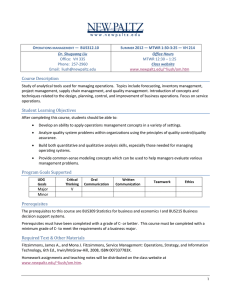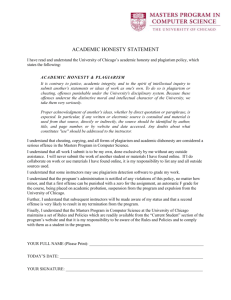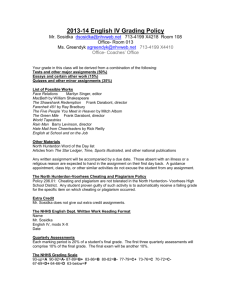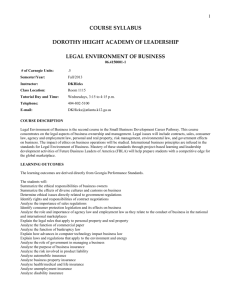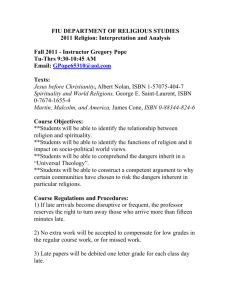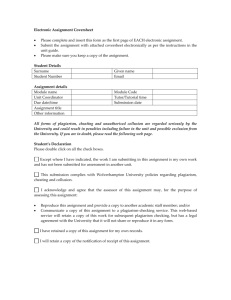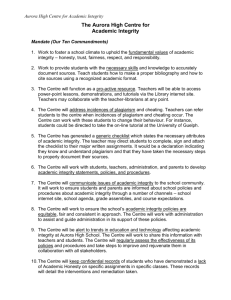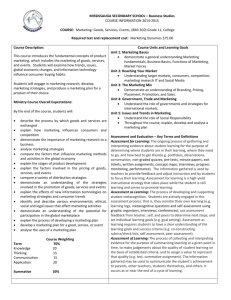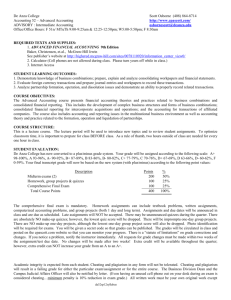Syllabus
advertisement
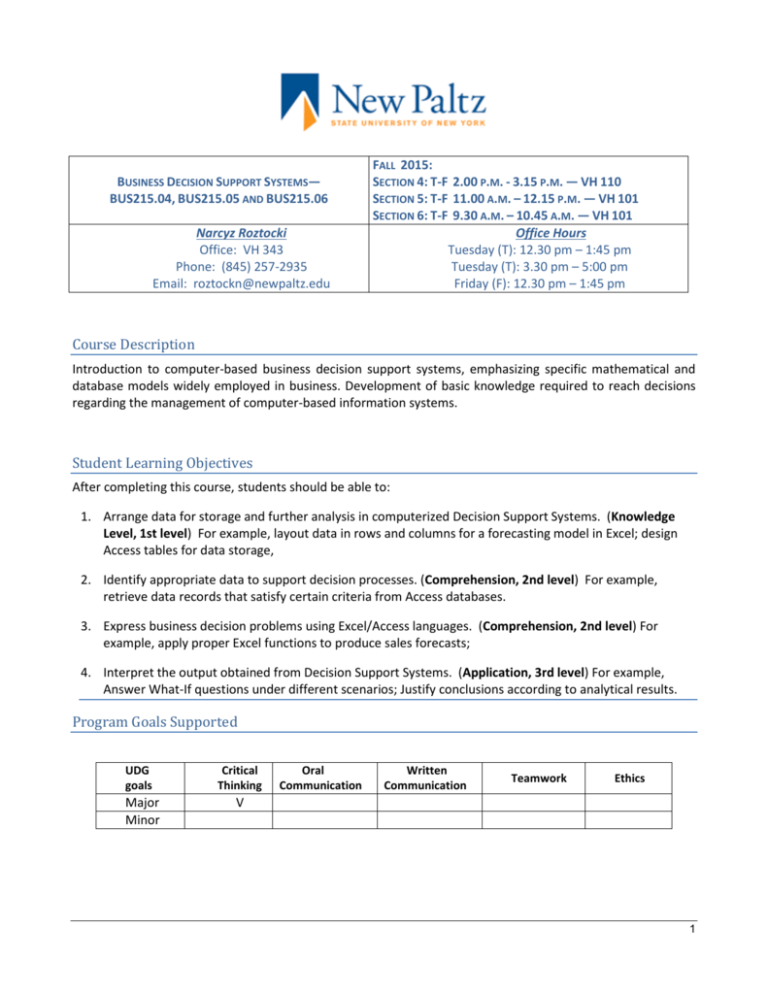
BUSINESS DECISION SUPPORT SYSTEMS— BUS215.04, BUS215.05 AND BUS215.06 Narcyz Roztocki Office: VH 343 Phone: (845) 257-2935 Email: roztockn@newpaltz.edu FALL 2015: SECTION 4: T-F 2.00 P.M. - 3.15 P.M. — VH 110 SECTION 5: T-F 11.00 A.M. – 12.15 P.M. — VH 101 SECTION 6: T-F 9.30 A.M. – 10.45 A.M. — VH 101 Office Hours Tuesday (T): 12.30 pm – 1:45 pm Tuesday (T): 3.30 pm – 5:00 pm Friday (F): 12.30 pm – 1:45 pm Course Description Introduction to computer-based business decision support systems, emphasizing specific mathematical and database models widely employed in business. Development of basic knowledge required to reach decisions regarding the management of computer-based information systems. Student Learning Objectives After completing this course, students should be able to: 1. Arrange data for storage and further analysis in computerized Decision Support Systems. (Knowledge Level, 1st level) For example, layout data in rows and columns for a forecasting model in Excel; design Access tables for data storage, 2. Identify appropriate data to support decision processes. (Comprehension, 2nd level) For example, retrieve data records that satisfy certain criteria from Access databases. 3. Express business decision problems using Excel/Access languages. (Comprehension, 2nd level) For example, apply proper Excel functions to produce sales forecasts; 4. Interpret the output obtained from Decision Support Systems. (Application, 3rd level) For example, Answer What-If questions under different scenarios; Justify conclusions according to analytical results. Program Goals Supported UDG goals Major Minor Critical Thinking Oral Communication Written Communication Teamwork Ethics V 1 Prerequisites None Required Text & Other Materials Information Systems Today: Managing in the Digital World by Joe Valacich and Christoph Schneider Publisher: Prentice Hall 6th Edition (6e) ISBN-10: 0132971216 ISBN-13: 9780132971218 http://www.amazon.com/Information-Systems-Today-Managing-Digital/dp/0132971690 Recommended Text: Business Analytics Step-by-Step Tutorial by Narcyz Roztocki ISBN: 9781329081024 http://www.lulu.com/content/paperback-book/business-analytics-step-by-step-tutorial/16634569 http://www.amazon.com/Business-Analytics-Step-Step-Tutorial/dp/1329081021 Website: http://www.newpaltz.edu/~roztockn/dss.htm Homework assignments and teaching materials will be distributed on the Blackboard. Grading Each student's final numerical score for this course is based on the following items and weights. 25% - Exam 1 25% - Exam 2 25% - Final exam 25% - Homework assignments and quizzes All business majors need an "C-" or better to pass the course. This course has been designated as a prerequisite of several courses. Failure to pass the course may result in extra time spent in the program. Be sure to take advantage of the 25% from homework assignments and quizzes. The following letter grades based on absolute percentage score will be assigned: 94% and above A 90%-93.99% A87%-89.99% B+ 83%-86.99% B 80%-82.99% B77%-79.99% C+ 73%-76.99% C 70%-72.99% C67%-69.99% D+ 60%-66.99% D 2 Dates to keep in mind First class: August 25, 2015; Last class: December 8, 2015 Last date to withdraw from this class: Friday, October 30, 2015 Class does not meet on: Tuesday, September 8; Tuesday, October 13; Friday, November 27; Exam 1: Friday, September 25 (tentative) Exam 2: Friday, November 6 (tentative) Final exam: Section 4: Tuesday, December 15, 2015: 12:30 p.m. - 2:30 p.m. Section 5: Tuesday, December 15, 2015: 10:15 a.m. - 12:15 p.m. Section 6: Friday, December 18, 2015: 10:15 a.m. - 12:15 p.m. Expectations Treat this class as you would your job: prepare by reading the text and doing assigned homework. Arrive promptly and remain in the classroom for the duration of the class period. Please do not exit and reenter the room during class time, except in an emergency situation; turn off your pager or cell phone during class. Be proactive: if you are having a problem with the material being covered, ask questions in class (if you don’t understand something, chances are very good that other students also need clarification), seek help and speak with me during office hours. Policies (applicable rules will be relaxed for students with documented health or personal problems) Make-up exams: a student who is unable to take an examination at the scheduled time must contact the professor prior to the time of the scheduled examination to make alternative arrangements for completing it. Absences: students who are absent from class should consult the class website and blackboard to view the announcements and homework assignments. Assignments submitted after the deadline: Late homework assignments will not be accepted. Cheating and plagiarism: students are expected to maintain the highest standards of honesty in their college work. Cheating, forgery, and plagiarism are serious offenses, and students that engage in any form of academic dishonesty will be subject to disciplinary action (see http://www.newpaltz.edu/advising/policies_integrity.html for college academic integrity policy). The School of Business Ethics Statement and Policy Regarding Unethical or Dishonest Behavior are appended, and can be viewed online at: http://www.newpaltz.edu/schoolofbusiness/adminacad_integrity.html and http://www.newpaltz.edu/schoolofbusiness/adminacad_behavior.html. Academic integrity policy statement: http://www.newpaltz.edu/ugc/policies_integrity.html Reasonable accommodation of individuals with disabilities statement: Any student who will need classroom and/or testing accommodations based on the impact of a disability should contact the Disability Resource Center, Student Union, Room 210, 845-257-3020. The DRC will provide for your instructors an Accommodation Memo verifying the need for accommodations. Students are encouraged to request accommodations as close as possible to the beginning of the semester. Computer Services’ acceptable-uses policy: Use of the computer resources and network facilities generally requires that you have a valid user account. You are responsible for the safeguarding of your computer account. Your account and network connection are for your individual use. A computer account is to be used only by the person to whom it has been issued. You are responsible for all actions originating through your account or network connection. You must not impersonate others or misrepresent or conceal your identity in electronic messages and actions. 3 Information on electronic SEIs: students are responsible for completing the Student Evaluation of Instruction (SEI) for this course and for all your courses with an enrollment of three or more students. I value your feedback and use it to improve my teaching and planning. Please complete the form online during the last week of classes. Tentative Schedule This outline is tentative and intended as a guide for planning purpose and it will be adjusted as class progresses. Check Blackboard and the class web page regularly for updates. Organizations, Environments, and Information Technology. Information Technologies: Concepts and Management. Strategic Information Systems. Supply Chain, Enterprise Resources Planning, and Business Process Reengineering. Electronic Commerce. Supporting Management and Decision Making. Data and Knowledge Management. Planning for Information Technology and Systems. Information Technology Economics. Introduction to Database Information from the Database / Database and Decision Making 4 SUNY New Paltz School of Business — Ethics Statement School of Business students are expected to maintain the highest standards of honesty in their college work. Cheating, forgery, and plagiarism are serious offenses, and students that engage in any form of academic dishonesty will be subject to disciplinary action. While we prefer to adhere to a code of honor in the School of Business, due to national trends in cheating, forgery, and plagiarism, we are instituting this policy within the school. Any student found cheating, committing forgery, or plagiarizing may suffer serious consequences ranging from failing a specific piece of work to failing the course. In some cases, a student may be expelled from the School of Business and the college. Your business education includes learning ethics and values. We trust that you have the basic foundation upon which we can build. You will be judged by your character as well as by your knowledge and skills since the business world increasingly demands ethical behavior of its employees. Honesty remains an admirable quality. Cheating is defined as giving or obtaining information by improper means in meeting any academic requirements or in other aspects of your professional conducts. The use for academic credit of the same work in more than one course without knowledge or consent of the instructor(s) is a form of cheating and is a serious violation of academic integrity. Forgery is defined as the alteration of forms, documents, or records, or the signing of such forms or documents by someone other than the proper designee. Plagiarism is the representation, intentional or unintentional, of another’s words or ideas as one's own. When using another person's words in a paper, students must place them within quotation marks or clearly set them off in the text with appropriate citation. When students use another’s ideas, they must clearly identify the source of the ideas. Plagiarism is a violation of the rights of the plagiarized author and of the implied assurance by the students that when they submit academic work it is their own work product. If students have any issues with respect to the definition of plagiarism, it is their responsibility to clarify the matter by conferring with the instructor. Cases requiring disciplinary and/or grade appeal action will be adjudicated in accordance with Procedures for Resolving Academic Integrity Cases, a copy of which is available in the office of the Vice President for Students Affairs, the office of the Provost for Academic Affairs, and in the academic Deans' offices. We, the members of the SUNY New Paltz School of Business community, are committed to practicing the highest standards of ethical behavior and demonstrating integrity in all we do. We practice these standards and expect them to be demonstrated by others not only in our business dealings, but in all our relationships. Ours is a culture of integrity. For us, ethical behavior means adhering to certain standards in both public and private. School of Business — Policy Regarding Unethical or Dishonest Behavior The school maintains a system (including software and web-based resources), by which students are well informed, educated and required to acknowledge by electronic signatures, the ethics, honesty and integrity standards of the School of Business, and the consequences of violating those standards. Instructors who identify any violators should report the incident to the Dean’s office for disciplinary action. The following procedure is followed by the dean’s office for handling such incidents. Penalties: The involved students may request an appeal through Academic Appeal Committee (undergraduate) or Graduate Council (graduate students). First time offenders receive a failing grade for the course, which can only be changed based on a favorable outcome of the appeals process, if applicable. The dean’s office keeps a list of first time offenders. The offenders are also required to recertify their understanding of our ethics, honesty and integrity standards. A second time undergraduate offender will be referred for possible dismissal to the Office of Student Affairs. A second time graduate student offender will be dismissed from the Master's degree program in which he or she is matriculated, subject to review by the Graduate Council. Note: Once a student completes the training program, he/she shall be treated equally regardless of their previous educational experience and cultural norms. Instructors are encouraged to remind students of our ethics, honesty and integrity standards at the beginning of each course. 5
